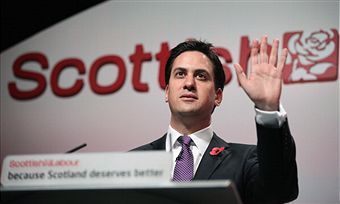 “Remember, our government paid down the debt before the crisis hit.” That’s
what Ed Miliband said in a speech last Friday, and I took exception to it at the time. My point was,
admittedly, quite blunt: how could the Labour leader make such a claim when debt was around £500 billion in 2006, and rising? So I’m glad that the excellent Full Fact blog has since looked into the matter, and come down broadly on my side – giving Miliband a 2-out-of-5 rating on their
truth scale. But some of their wider points are worth developing, which is why I’m returning to the topic now.
“Remember, our government paid down the debt before the crisis hit.” That’s
what Ed Miliband said in a speech last Friday, and I took exception to it at the time. My point was,
admittedly, quite blunt: how could the Labour leader make such a claim when debt was around £500 billion in 2006, and rising? So I’m glad that the excellent Full Fact blog has since looked into the matter, and come down broadly on my side – giving Miliband a 2-out-of-5 rating on their
truth scale. But some of their wider points are worth developing, which is why I’m returning to the topic now.
First, though, the observation that I made on Friday. Here’s a graph which shows our national debt throughout the Labour years. From this vantage point, any claim that Labour “paid down the debt before the crisis hit” is quite ridiculous. It was about £490 billion in 1997, and fell in the years to 2001, but then rose until it was over £550 billion when Lehman Brothers collapsed:

But as Full Fact point out, there is another way of looking at debt – and one which bodies like the IFS prefer because it better captures a country’s ability to service that debt. That is, the debt-to-GDP ratio. Here’s the graph:

This is, I imagine, is the basis for Ed Miliband’s claim – and the only way some truth can be eked out of it. After all, debt was over 41 percent of GDP when Labour took over. When the credit crunch crunched, it was around 37 percent. It had fallen from the level that Labour inherited.
Yet even if we abide by those parameters, there are still problems with Miliband’s claim. He said that Labour had paid down the debt “before the crisis hit”. Actually, it had fallen as a percentage of GDP for Labour’s first four or five years in office (when they were more or less following Tory spending plans), but then rose in the five years leading up to the crash. Whether this counts as paying down the debt “before the crisis hit”, I’ll let CoffeeHousers decide.
But should we even accept the debt/GDP angle in the first place? Ed Miliband used a colloquial phrase – “paid down the debt” – to describe Labour’s management of the public
finances, which opens it up to a colloquial response. So, as CoffeeHouser TrevorsDen put it last
Friday:
In other words, let’s leave the wonkery aside. To most people, the Miliband claim will mean that Labour reduced the actual amount of cash that we owe as a nation. Yet we know that they did nothing of the sort. It’s just that the debt-to-GDP ratio shrank as the economy grew. That’s like a credit card junkie claiming he has “paid down” his debt simply because he’s had a pay rise. Unless the number following the £-sign on his credit card bill goes down, few people will recognise that he is tackling his debts.“…measuring debt as a % of GDP is ‘misleading’ as well. Debt is money; increased debt is more money and it needs to be repaid.”
Ok, so the public finances aren’t a credit card bill. GDP growth isn’t a pay rise. But that’s precisely the point. When Ed Miliband says that “our government paid down the debt before the crisis hit,” he says it knowing that this creates a much kinder impression of Labour’s fiscal management than was actually the case. Gordon Brown was a master at this kind of casual deception, right up until when he told a Labour voter in Rochdale that his government had a plan to “cut the debt by half over the next four years”. Thing is, the New Generation promised something more.






Comments